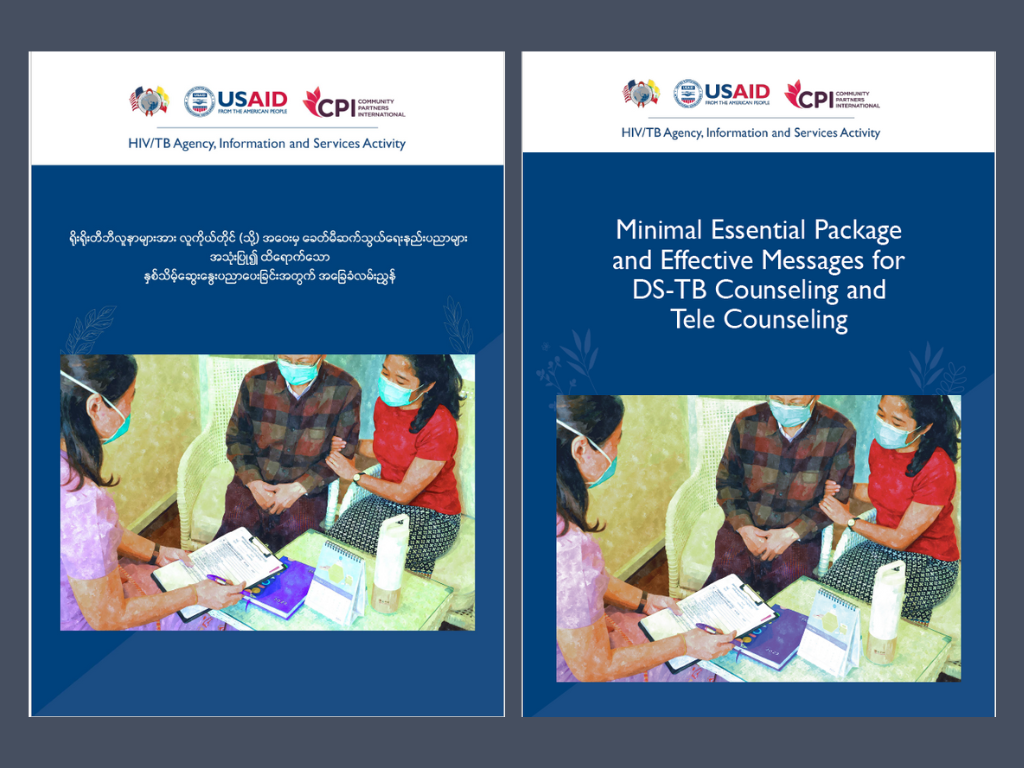“When I was informed that I am suffering from TB disease, I did not know much about it. I was apprehensive and did not know how to get treatment. But during counseling sessions, my concerns were addressed. I learnt about medication, treatment, and how to implement infection control measures for my family,” said Ko Zaw Myo Maung, a 20-year-old patient who recovered from TB.
Counseling is an integral part of the comprehensive care needed for individuals and families suffering from drug-sensitive tuberculosis (DS-TB). Beyond medical treatment, counseling addresses emotional distress, educates patients, empowers them to take charge of their health, and reduces the social stigma associated with the disease.
By providing holistic support, DS-TB counseling not only contributes to successful treatment outcomes but also improves the quality of life for patients, families, and communities.
Counseling: A powerful tool
Being diagnosed with any medical condition can be emotionally distressing. Patients often experience fear, shock, denial, anxiety, or depression when a disease is diagnosed. If the medical condition is contagious, like in the case of TB, patients might also face stigma and isolation in their social environments. Limited information in the community can intensify myths and prevent patients from seeking treatment.
That is why counseling becomes a powerful tool to inform patients, promote care-seeking behavior, create awareness, and dispel myths. A counselor can support and empower patients to help them make the right decisions and guide them in their treatment journey.
“Like with other health issues, it's common for TB patients to face concerns regarding potential treatment side effects. Many of these individuals start their treatment journey with limited information about what to anticipate. However, the availability of a dedicated counselor is pivotal. Their guidance helps patients acquire a better understanding of possible side effects and encourages them to promptly communicate any concerns they might experience, ultimately enhancing the quality of their healthcare,” said Ma Myint Sein, a volunteer TB counselor.
Counseling especially becomes more essential when the treatment regimen of a disease is relatively complex, as in the case of TB. Due to financial difficulties or emotional constraints, many TB patients drop out of the treatment. Counseling in these cases guides the patient to avail free of cost public health services and medication and provides them with the emotional support that motivates them to complete their regimen.
“Counseling, through all three phases from pre-diagnosis, pre-treatment to adherence, is crucial and plays an important role in improving treatment adherence and completion rates for TB. This also leads to reducing burden on medical doctors, health care providers, and caregivers,” remarked Dr. Aung Thu, Technical Lead, PATH Myanmar.
Enabling counseling through comprehensive guidelines
Under the HIV/TB Agency, Information and Services Activity (AIS) consortium of the United States Agency for International Development (USAID), PATH has made significant progress in strengthening DS-TB counseling in the regions of Yangon, Mandalay, Sagaing, Kachin, and Shan (North) in Myanmar.
We have developed a comprehensive guideline manual titled Minimal Essential Package and Effective Messages for DS-TB Counseling and Tele Counseling in English and Burmese languages with the goal of making important information related to TB available for health care providers, including peer educators and counselors.
The manual consists of three focus areas: (i) Minimal essential package for counseling, (ii) Effective messages for DS-TB counseling, and (iii) Tips for tele counseling. It discusses counseling concepts, basic counseling techniques, and effective counseling/tele counseling techniques for health care providers that can enhance patients’ acceptance of TB diagnosis, enrollment, and treatment completion. The ultimate purpose of this work is to encourage community involvement in TB case finding and promote treatment adherence using counseling techniques.

The covers of the counseling manual, Minimal Essential Package and Effective Messages for DS-TB Counseling and Tele Counseling
Consequently, the guideline was disseminated through training of trainers (TOT) sessions in the first quarter of 2023. As a result, AIS TB implementing partners have integrated DS-TB counseling and tele counseling into their operational frameworks over the course of about a year.
“In counseling TOT training, I am glad to learn about how crucial the golden minutes¾the very first few minutes of counseling are. I learnt about ways to make my counseling more engaging, developed important preparation tips for tele counseling, and learnt some counseling concepts to build trust and relationships with the patients,” said Ma Myint Myint Sein, a counselor who attended the first TOT session.



